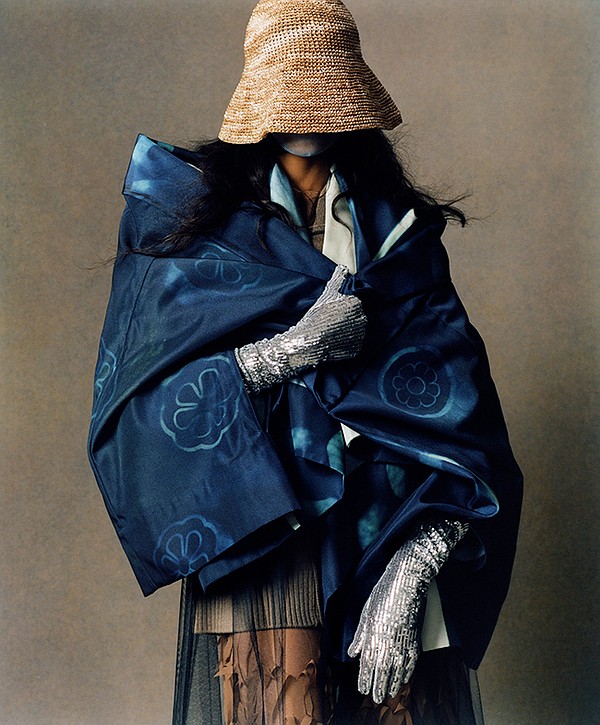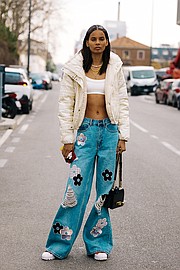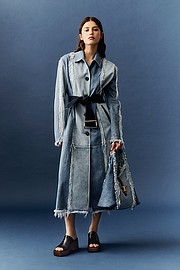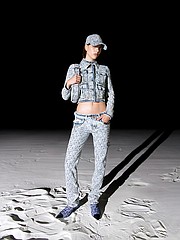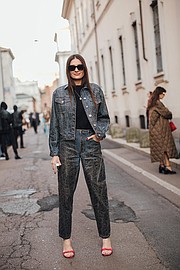FASHION
Fashion Snoops: Denim’s Craft Revival
For decades, crafted denim was a topic for a niche audience of denim connoisseurs—inside knowledge that felt foreign to the average consumer. Today, an increasing awareness of sustainability and rising consumer interest in heritage and tradition are influencing a denim renaissance that honors the process of creation, putting the focus on the journey of design itself as much as the end result. Brands are transforming today’s denim offerings by bringing to light the craftsmanship interwoven in its creation while refreshing the market with progressive denim, reimagining iconic pieces for a new generation.
Honoring the process that goes into an apparently simple jean is not only culturally informed but also highlights the skills and techniques developed over time that have transformed the denim industry and contributed to its legacy today. Its weave, dyes, washes and finishes—and even repurposing old or leftover scraps into new items—are attributes that are now just as important as shape and construction. They represent the true essence of the garment, imbuing the design with an irreplaceable artisanal touch.
Rooted in Tradition
With a rich history that dates back to the late 17th century, denim making was founded on the principles of useful skill and material mastery, making it an ideal choice for workwear styles. And while its manufacturing has evolved over the years, pioneering mills like Japan’s esteemed Kurabo and Italy’s family-owned Candiani continue to maintain their stance as industry-leading denim artisans with decades of heritage as validation. They, like many others, advocate for the value of premium cotton fibers, slow craft techniques and meticulous detailing above all else. Likewise, well-established denim brands, namely Levi’s, Lee and Wrangler, all share an equally rich and layered legacy where craft is central to their products.
This penchant for craft and artisanal heritage is no stranger to the luxury end. Fashion houses and high-end designers across the globe have found denim to be a perfect canvas for crafted designs, reframing denim’s humble origins to highlight the skilled artistry imbued in each garment.
At Tod’s, for example, Creative Director Walter Chiapponi delivered a Resort ’23 collection rooted in denim craftsmanship, particularly through traditional patchwork techniques where pieces of fabric, carefully sewn together with unfinished, frayed edges, exuded a textural, almost imperfect surface for items like straight-leg jeans and trench coats. The designer noted that the uneven textures were meant to bring a sense of humanity to the designs, connecting the wearer to the garment as if it too had a history.
Similarly, traditional dyeing techniques have also been gaining momentum across the denim landscape. At Maison Margiela, Creative Director John Galliano infused a traditional shibori dyeing technique into statement pieces for his Resort ’22 collection. Evoking a nostalgic emotion of hand-me-downs, pieces seemed to display a patina of age carefully adorned by shibori dye patterns in true indigo dyes. Utilizing a technique that emerged to renew old, faded, stained and damaged clothes, Galliano pays homage to what makes craftsmanship so appealing—the skilled hands that have, for centuries, transformed such humble textiles into masterpieces.
Emerging Technologies
Over the years, adaptations to new technologies in machinery, fibers and finishes have helped restructure the modern face of denim craftsmanship. No longer limited to classic 3X1 twill constructions or simply dyed and untreated surfaces, a host of creative and technical offerings are emerging to propose unique takes on the classics. Whether it be through elaborate devoré finishing techniques or embedded fiber-tracing technologies, perspectives both old and new have helped solidify denim as a sizable player thriving at the intersection of craft and technology.
Continued developments from industry-leading weavers and finishers have spurred a new wave of denim creatives aiming to realize the endless potential of this beloved textile. Among those leading the pack, Diesel has seen a recent resurgence among consumers aligning with the brand’s fresh approach to denim as the ultimate design medium for self-expression.
Fusing classic denim archetypes from Diesel’s archive with experimental advancements in dyeing and finishing, the brand, under the direction of Glenn Martens, has forged something altogether new for the once-humble fabric. Offerings from its Resort ’23 collection emerged with hybrid dye characteristics and super-tactile surface distressing, all deserving of their own moment in the spotlight. Even earlier collections from Diesel such as its FW 22/23 showing, featured mirror-effect waterproof waxing, eroded super fades and intensely shredded fur-inspired outcomes unlike anything seen before. Martens has undoubtedly reshaped the brand with his unique forward vision, pushing the boundaries of traditional denim craftsmanship while garnering a cult-like status across fashion communities.
Propelled by the ingenuity, skill and passion of their founders, modern players in the denim industry continue to hone denim’s potential in a true exercise of creativity. Coupled with sustainability-led innovation, crafted styles today not only look good but also do good for the planet. New voices in the denim space like Pangaia and Reformation have made conscious efforts to improve production processes, including the use of regenerative Himalayan nettle fibers and new pigments with traceability technologies embedded directly into the fabric of jeans.
As consumers become more concerned with a sustainable future, they also learn to develop a greater appreciation for the history behind the products they consume. For denim, that’s often one of craftsmanship, technique and humbleness–elements that can so commonly be overlooked in today’s mass-produced industry but that ultimately connect us back to our traditions, immortalizing our heritage for future generations.
About Fashion Snoops: FS is a global trend forecasting agency helping leading consumer-facing brands around the world unlock innovation and propel growth. Through a combination of human and artificial intelligence, we analyze cultural shifts and interpret detected patterns in order to surface trend-driven business opportunities. Learn more at www.fashionsnoops.com.
